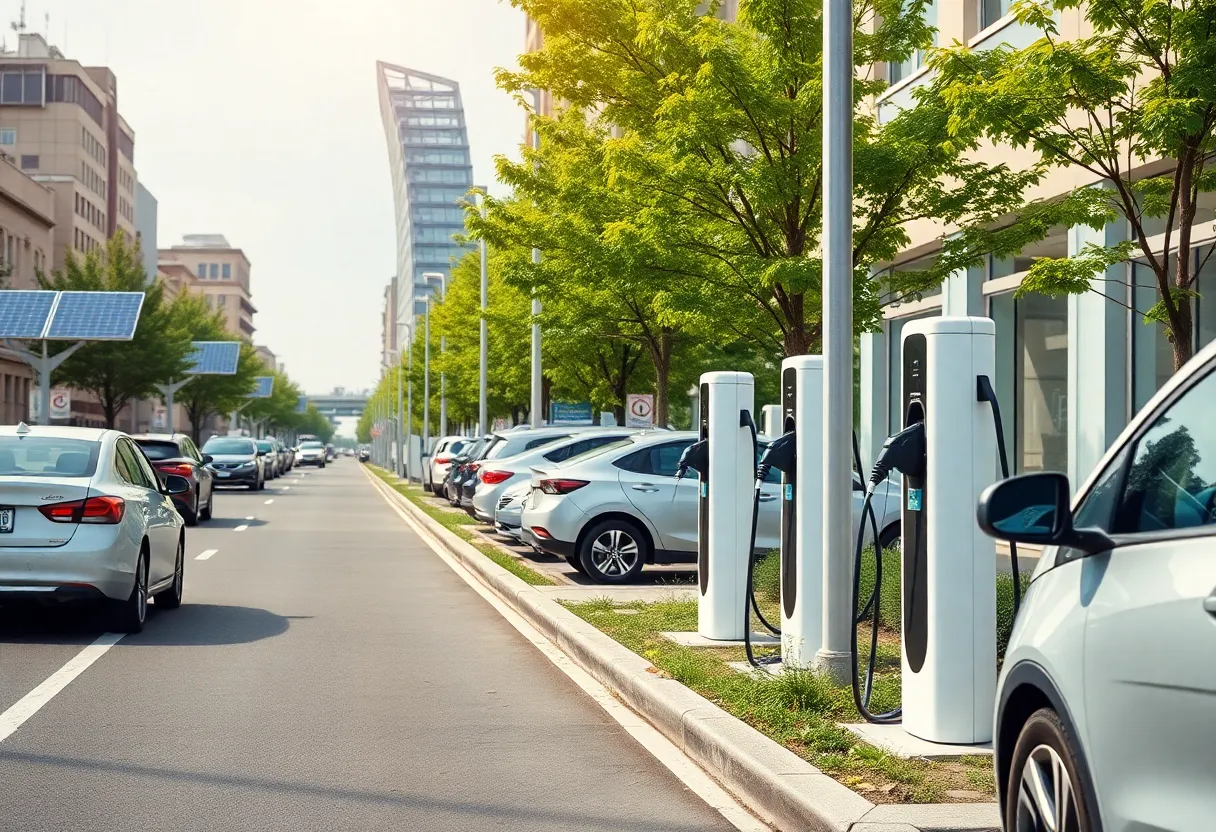Tucson, October 19, 2025
Pima County has approved a $25 million bond to implement a network of 100 electric vehicle charging stations across Tucson. This initiative aims to enhance sustainable transportation, reducing urban emissions by 20% and improving air quality. Funded by federal infrastructure funds, the stations are expected to be operational by 2026. Partnerships with Tesla and local utilities will facilitate deployment, which includes solar integration for sustainable energy use. The project not only addresses environmental concerns but also promotes job creation in related tech sectors.
Tucson Approves $25 Million Bond for EV Charging Network
Pima County has greenlit a $25 million bond to establish a comprehensive network of electric vehicle charging stations throughout Tucson, marking a pivotal step toward greener transportation options. This initiative aims to install 100 stations citywide, with projections to cut urban emissions by 20%, enhancing air quality in densely populated areas.
Project Funding and Timeline
The funding for this project draws from federal infrastructure funds, ensuring a solid financial foundation without straining local budgets. The charging network is slated for full deployment by 2026, with efforts focused on rapid implementation to meet growing demand for electric vehicles. This timeline reflects collaborative planning to integrate the stations seamlessly into Tucson’s existing infrastructure.
Key elements of the project include solar integration, where many stations will harness renewable energy sources to power operations, further amplifying environmental benefits. This approach not only reduces reliance on traditional electricity grids but also positions Tucson as a leader in sustainable urban mobility.
Partnerships Driving Implementation
Implementation involves key collaborations with Tesla and local utilities, which will handle technical aspects like station design, installation, and maintenance. These partnerships ensure the network’s reliability and scalability, addressing common barriers to EV adoption such as range anxiety and charging accessibility.
By placing stations in high-traffic areas, including downtown districts, shopping centers, and residential neighborhoods, the project targets everyday commuters and long-distance travelers alike. This strategic placement will facilitate easier transitions to electric vehicles, potentially increasing their market share in the region.
Economic and Environmental Impacts
Beyond immediate environmental gains, the initiative is expected to spur job creation in related tech sectors, from installation crews to software developers for charging management systems. Local economies stand to benefit as the demand for EV maintenance and support services grows, fostering innovation in green technologies.
The anticipated 20% reduction in emissions specifically addresses urban air pollution, a pressing concern in Tucson where vehicle traffic contributes significantly to smog and particulate matter. Health experts have long highlighted the need for such measures to mitigate respiratory issues and improve overall public well-being.
Broader Context of Green Initiatives in Tucson
This bond approval aligns with ongoing efforts in Pima County to promote clean energy access, building on previous investments in renewable projects. The county’s focus on sustainable development responds to national trends toward electrification, supported by federal incentives that encourage states and localities to adopt eco-friendly policies.
Electric vehicle adoption has accelerated nationwide, with sales surging due to advancements in battery technology and declining costs. In Arizona, where sunny climates favor solar-powered solutions, initiatives like this one capitalize on natural advantages to make green transportation more viable.
The project’s emphasis on equity ensures that charging stations reach underserved communities, preventing the green transition from exacerbating existing divides. Public input during planning phases helped shape the network’s layout, prioritizing accessibility for low-income and rural-adjacent areas within Tucson.
Challenges such as grid upgrades and permitting processes are being navigated through the aforementioned partnerships, minimizing delays. Once operational, the network will integrate with apps for real-time availability, enhancing user convenience.
As Tucson moves forward with this bond, it sets a precedent for other cities grappling with similar environmental goals. The combination of federal support, private sector involvement, and local commitment underscores a multifaceted approach to tackling climate challenges at the community level.
The approval of this $25 million bond on October 19, 2025, represents more than infrastructure—it’s a catalyst for lasting change in how Tucsonans travel and live sustainably.
FAQ
What is the main purpose of the $25 million bond approved by Pima County?
The bond funds a network of 100 electric vehicle charging stations across Tucson to promote green transportation and reduce emissions by 20% in urban areas.
How is the project funded?
It is funded by federal infrastructure funds, ensuring the $25 million bond supports the installation without additional local tax burdens.
What environmental benefits does the charging network offer?
The network of 100 stations will reduce emissions by 20% in urban areas, with solar integration enhancing its sustainability.
Who is involved in the project’s implementation?
Collaborations with Tesla and local utilities ensure rapid deployment by 2026, handling installation and maintenance.
What economic impacts are expected from this initiative?
It will spur EV adoption and create related tech jobs, boosting local economies through increased demand for green services.
When was the bond approved, and by when will the network be deployed?
The bond was approved on October 19, 2025, with full deployment of the 100 stations expected by 2026.
Key Features Chart
| Feature | Description |
|---|---|
| Funding Amount | $25 million bond funded by federal infrastructure funds |
| Number of Stations | 100 electric vehicle charging stations across Tucson |
| Environmental Impact | Reduce emissions by 20% in urban areas with solar integration |
| Timeline | Rapid deployment by 2026 |
| Partnerships | Collaborations with Tesla and local utilities |
| Economic Benefits | Spur EV adoption and related tech jobs |
Deeper Dive: News & Info About This Topic
HERE Resources
Illegal Street Takeovers Disrupt Tucson
Pima County Deputies Search for Gunman in Tucson Shooting




